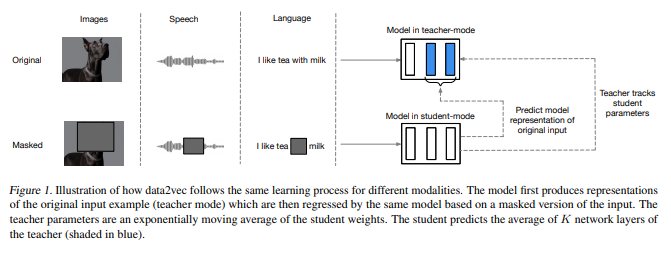🚀 Data2Vec-Audio-Large-960h
A large model pretrained and fine-tuned on 960 hours of Librispeech for 16kHz sampled speech audio.
This model is a large-scale one that has been pretrained and fine - tuned on 960 hours of Librispeech data with 16kHz sampled speech audio. When using this model, ensure that your speech input is also sampled at 16kHz. Facebook's Data2Vec Paper
Authors: Alexei Baevski, Wei - Ning Hsu, Qiantong Xu, Arun Babu, Jiatao Gu, Michael Auli
📚 Documentation
Abstract
While the general idea of self - supervised learning is identical across modalities, the actual algorithms and objectives differ widely because they were developed with a single modality in mind. To get us closer to general self - supervised learning, we present data2vec, a framework that uses the same learning method for either speech, NLP or computer vision. The core idea is to predict latent representations of the full input data based on a masked view of the input in a self - distillation setup using a standard Transformer architecture. Instead of predicting modality - specific targets such as words, visual tokens or units of human speech which are local in nature, data2vec predicts contextualized latent representations that contain information from the entire input. Experiments on the major benchmarks of speech recognition, image classification, and natural language understanding demonstrate a new state of the art or competitive performance to predominant approaches.
The original model can be found under https://github.com/pytorch/fairseq/tree/main/examples/data2vec.
🔧 Technical Details
Pre - Training method

For more information, please take a look at the official paper.
💻 Usage Examples
Basic Usage
To transcribe audio files the model can be used as a standalone acoustic model as follows:
from transformers import Wav2Vec2Processor, Data2VecAudioForCTC
from datasets import load_dataset
import torch
processor = Wav2Vec2Processor.from_pretrained("facebook/data2vec-audio-large-960h")
model = Data2VecAudioForCTC.from_pretrained("facebook/data2vec-audio-large-960h")
ds = load_dataset("patrickvonplaten/librispeech_asr_dummy", "clean", split="validation")
input_values = processor(ds[0]["audio"]["array"], return_tensors="pt", padding="longest").input_values
logits = model(input_values).logits
predicted_ids = torch.argmax(logits, dim=-1)
transcription = processor.batch_decode(predicted_ids)
Advanced Usage
This code snippet shows how to evaluate facebook/data2vec-audio-large-960h on LibriSpeech's "clean" and "other" test data.
from transformers import Wav2Vec2Processor, Data2VecAudioForCTC
from datasets import load_dataset
import torch
from jiwer import wer
processor = Wav2Vec2Processor.from_pretrained("facebook/data2vec-audio-large-960h").to("cuda")
model = Data2VecAudioForCTC.from_pretrained("facebook/data2vec-audio-large-960h")
librispeech_eval = load_dataset("librispeech_asr", "clean", split="test")
def map_to_pred(batch):
input_values = processor(batch["audio"]["array"], return_tensors="pt", padding="longest").input_values
with torch.no_grad():
logits = model(input_values.to("cuda")).logits
predicted_ids = torch.argmax(logits, dim=-1)
transcription = processor.batch_decode(predicted_ids)
batch["transcription"] = transcription
return batch
result = librispeech_eval.map(map_to_pred, batched=True, batch_size=1, remove_columns=["audio"])
print("WER:", wer(result["text"], result["transcription"]))
Result (WER):
| "clean" |
"other" |
| 1.89 |
4.07 |
📄 License
This project is licensed under the apache - 2.0 license.
📦 Metadata
| Property |
Details |
| Datasets |
librispeech_asr |
| Tags |
speech, hf - asr - leaderboard |
| Widget Examples |
- Example 1: Librispeech sample 1
- Example 2: Librispeech sample 2 |
| Model Index |
- Name: data2vec - audio - large - 960h
- Results:
- Task: Automatic Speech Recognition
- Dataset: LibriSpeech (clean), Test WER: 1.89
- Dataset: LibriSpeech (other), Test WER: 4.07 |

